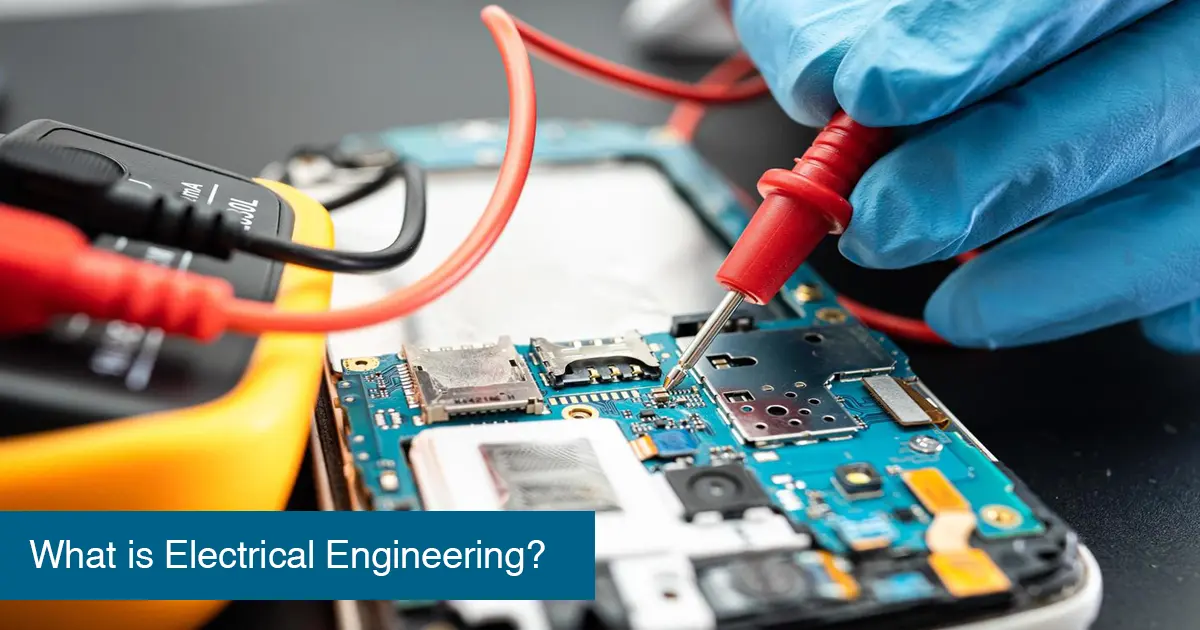FET Blogs


FET Blogs



15 July 2025
Electrical engineering is one of the most interesting and ancient fields of engineering. It is the discipline that lights our houses, illuminates our cities, and operates our gadgets. Electrical engineering is the study, design, and application of systems and devices that operate with electricity, electronics, and electromagnetism.
This field has revolutionised the world. Electrical engineering is a rewarding profession that combines creativity, problem-solving, and cutting-edge science. Electrical engineers have developed a wide range of new technologies, from light bulbs to mobile phones and renewable energy systems.
Professional electrical engineering started in the late 19th century, an era of renowned inventors, including Thomas Edison and Nikola Tesla. As electric power emerged, the need arose for specialists to design power systems, motors, generators, and communication systems.
With the development of technology, electrical engineering branched out into electronics, telecommunications, computers, and control systems. For this reason, the term 'Electrical and Electronics Engineering' is widely used.
Whether you’re curious about an introduction to electrical engineering or thinking about a career in it, the answer is broad and fascinating. Electrical engineers work on a variety of types of projects:
They use mathematics and physics to develop and implement new ideas and design computer programs. They directly impact our everyday lives, making them safer, more efficient, and more interconnected.
The majority of the students start with a BE electrical engineering. "BE" stands for Bachelor of Engineering and is the typical undergraduate degree in most countries.
The Bachelor of Engineering in Electrical Engineering is a four-year degree. It includes main courses, elective courses, and laboratory work and typically involves internships in firms. It prepares students for various careers or further studies.
The second most popular degree is the Bachelor of Science in Electrical Engineering. It is generally referred to as a Bachelor of Science (BSc) or a Bachelor of Technology (B.Tech), depending on where the course is being pursued. The course remains the same, although the names differ. It entails theory, practical training, and project work.
No matter which undergraduate course you choose, you will be left with a sound understanding of electrical and electronics engineering concepts.
After completing an electrical engineering bachelor’s degree, many students pursue advanced studies. A master's degree in electrical engineering allows you to specialise and deepen your knowledge.
A master's degree in electrical engineering typically takes 1 to 2 years. It can focus on areas like:
This level of education opens doors to advanced research roles, higher salaries, and leadership positions. It’s also excellent preparation for moving into academia or advanced R&D.
The job market for electrical engineers is vast. Graduates can work in:
Roles vary from design engineer to systems analyst, project manager, researcher, or entrepreneur.
You may wonder what is electrical engineering and how it differs from electrical and electronics engineering. The short answer is that electrical engineering deals with large systems, such as power plants, power systems, and motors. Electronics engineering has evolved to handle small systems, including circuits, microchips, and devices.
Today, the distinction is not clear. Smartphones, for instance, employ both power engineering (e.g., battery control) and electronics engineering (e.g., processors and displays). That is why most universities offer combined degrees in electrical and electronics engineering. They enable you to study both sides of the engineering field.
The world faces global warming, increased urbanisation, and technological progress. Electrical engineers will continue to be in high demand. Renewable energy, smart grids, electric vehicles, and advanced communication systems all require skilled engineers.
This is why there is a high demand for BE electrical engineering and advanced degrees. Companies seek engineers who can innovate, adapt to change, and contribute to creating a sustainable future.
Electrical engineering is not just a subject; it is vital in today's world. It supplies electricity for our homes and enables communication worldwide. It influences nearly every aspect of our daily lives.
Electrical engineering information is crucial if you seek a career that combines science, innovation, and service. There are countless opportunities to create new devices, develop alternative power systems, or mechanise industries.
Suppose you wish to earn a BE in electrical engineering, a bachelor's degree, or a master's in electrical engineering. In that case, you will join a proud community of inventors and problem-solvers who make modern life possible.
A1. An electrical engineer designs, develops, tests, and maintains electrical systems and equipment. They work with power generation, electronics, communications, and control systems. They repair faults, enhance technology, and provide safe and sound electrical services.
A2. The eight main types of electrical engineering are power engineering, electronics engineering, control systems, telecommunications, instrumentation, computer engineering, microelectronics, and signal processing. Each area focuses on designing, developing, and managing electrical systems.
A3. The "best" electrical field is what you like and what you want to do. Most people prefer power systems for energy jobs, electronics for devices we use, telecommunications for networks, and control systems for automation. Choose the field that you find most exciting and has good opportunities in your region.
A4. High-demand positions that involve complex technology usually have the highest salaries in electrical engineering. Electrical engineers typically have the highest wages in power systems, oil and gas, aerospace, or advanced electronics. Salaries also rise with experience and advanced degrees.
A5. Michael Faraday is known as the inventor of electrical engineering. His early experimentation with electromagnetism and electrochemistry laid the groundwork for the modern electrical system. Faraday's discoveries, including electromagnetic induction, revolutionised science and paved the way for developing electric motors, generators, and transformers.
Popular Post
17 February 2026
AIE Full Form
10 February 2026
AEIE Full Form
22 January 2026
AE Full Form
16 January 2026
What is Aerospace Engineering?
16 January 2026
What is Chemical Engineering?
Ask an Expert for Free